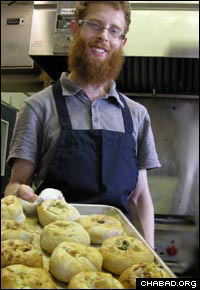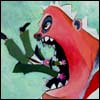Growing up in London, Yudi Weinbaum would literally "never be found in the kitchen," as he tells it. Today, at 25 years of age and half a planet away, he's in the kitchen six days a week at the helm of his very own deli on the Hawaiian island of Oahu.
The young yeshiva graduate's culinary ambitions began six years ago while working for Chabad-Lubavitch emissaries. He realized then that he wanted to do something "a little different, off the beaten path," but to this day, when pressed, he can't come up with what specifically drew him to the stovetop.
Still, he trained for three years at Sharrett Catering, one of London's top kosher catering firms, learning the skills necessary to serve the most elegant of weddings and bar mitzvahs. After he married his wife Estee, who grew up in Hawaii, the young couple settled in Florida, where he managed a kosher Italian steakhouse in Miami. A year-and-a-half later, he found himself longing for a place of his own.
With a baby on the way, the Weinbaums decided to try life in Estee's hometown of Honolulu in order to be with family. They made a firm resolution: If he couldn't find work that he enjoyed, they would return to Miami.
Rabbi Itchel and Pearl Krasnjansky, co-directors of Chabad of Hawaii, suggested that the young chef open a kosher restaurant on the island. There had been an Israeli food shop a year prior – the only kosher store on Oahu – but it had closed, leaving the community without a single kosher establishment. Krasnjansky believed that "if someone opened something serious, it could be successful."
The venture that led to the current Yudi's Deli began with a small catering business operated out of the Weinbaum's apartment in Oahu. In July 2006, he posted an ad on the Krasnjanskys' Web site encouraging patrons to enjoy exquisitely prepared kosher food thousands of miles from the mainland. A month later, he had 100 orders for Shabbat meals to cater and deliver.
"It was clear there was a big demand for kosher food here," says Weinbaum. "But I wanted to do something on a day-to-day basis."
The answer was simple: Open a space with a kitchen big enough for the catering end of the business, and space for diners and people ordering food to go. He set up the deli in a converted gas station near the Chabad synagogue in Waikiki. With its informal atmosphere and pleasant outdoor seating, the restaurant was an instant hit for both tourists and locals.
Though Oahu has plenty of Hawaiian, Vietnamese, Japanese and Korean restaurants to choose from, Yudi's Deli is clearly unique, and attracts all kinds of locals, many of whom are not Jewish.
With Chabad of Hawaii personnel providing the kosher supervision, the deli serves huge stacked sandwiches, burgers and steaks, knishes and, according to local customer Daniel Ziegler, "the best kosher falafel for 3,000 miles in any direction."
The regular, who lived for many years in New York City, pauses for effect before adding with a laugh, "It's also the only kosher falafel within 3,000 miles."
Because the deli offers items not found elsewhere in the area, it's a hit with residents of the neighborhood.
"They seem very happy to eat kosher," says Weinbaum. "And then I find out they happen to be Jewish."
So in that regard, it serves the community in more ways than one. Not only do residents have a ready source of kosher food, but for some, eating at the restaurant is a public act of affirming their Jewish identity.
With the restaurant picking up steam, the catering side of the business, Oahu Kosher, continues to grow, delivering special Shabbat meals and other entrees to hotels on the island. With 72 hours notice, the business can deliver to each of the Hawaiian islands. In addition, Weinbaum ships in raw meat from Los Angeles twice a month for delivery to the community and runs a distribution business for kosher groceries and non-perishables. He's also expanding the operation with catering to the airlines and cruise ships, as well as selling kosher products to local supermarkets.
According to Weinbaum, the possibilities seem endless.
"Kosher shouldn't be a problem in Hawaii," he says. "People should be able to enjoy the beauty of Hawaii and still get great kosher food."
Ziegler, who has lived in Hawaii for 16 years, says the restaurant makes Honolulu feel more like a community.
"They say the first thing a community needs is a mikvah, then a shul. After that, I think it needs a restaurant," he states. "When you have 50 restaurants to choose from, one doesn't make such a difference." But in Hawaii, where one small deli makes a world of difference, "it's a place we are proud of. It helps to make us a community."








Start a Discussion